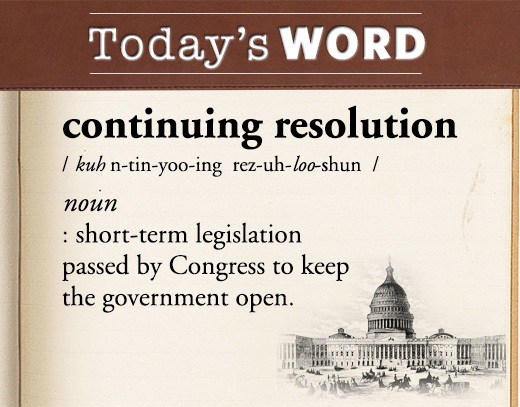 Congressional leaders say it’s likely the House and Senate will not pass a budget before the end of the fiscal year. Instead, Congress is headed towards a continuing resolution to keep spending at current levels at the start of fiscal 2016. “I don’t want to do it, but being realistic, that’s what we’ve had to do in the past,” said Rep. Hal Rogers, R-Ky., in an interview with Politico. “And at the end of the fiscal year, it’s either a shut down or CR—and obviously a CR is better.” Rogers is chairman of the House Appropriations Committee.
Congressional leaders say it’s likely the House and Senate will not pass a budget before the end of the fiscal year. Instead, Congress is headed towards a continuing resolution to keep spending at current levels at the start of fiscal 2016. “I don’t want to do it, but being realistic, that’s what we’ve had to do in the past,” said Rep. Hal Rogers, R-Ky., in an interview with Politico. “And at the end of the fiscal year, it’s either a shut down or CR—and obviously a CR is better.” Rogers is chairman of the House Appropriations Committee.
At issue is sequestration, the automatic spending cuts to defense and non-defense related programs that were included in the fiscal 2011 Budget Control Act. A majority of Republicans want to get around sequestration and provide relief to the Defense Department by adding $38 billion to the Overseas Contingency Operations fund. Democrats and President Barack Obama have said they won’t consider it unless the spending bill also includes relief for domestic programs. Obama released a budget proposal earlier this year with figures above sequestration levels, including $37 billion over spending caps on the nondefense side and $38 billion over caps in defense spending.
Having to vote against giving money to domestic programs during an election year is not an easy thing to do. EANGUS remains hopeful that the political horse trading that needs to take place will happen, and agreements on appropriations bills will be reached. However, until that happens, new programs in the fiscal 2016 National Defense Authorization Act will be put on hold until more permanent funding is in place. EANGUS expects cost-neutral NDAA provisions on veterans’ status, legislation on the National Guard’s State Partnership Program, and provisions on retirement and benefit compensation restructuring to go forward.

